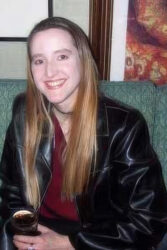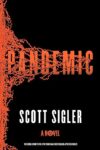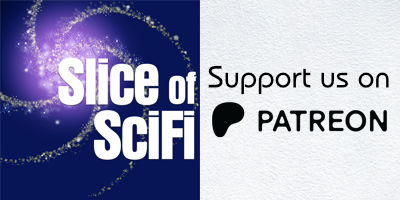Alice is a fascinating individual. While earning her Bachelors degree at Webster University she studied the worldwide distribution of folkloric creatures such as lake serpents like Ogopogo, Bigfoot and the Chupacabra, topics near and dear to my heart. She went on to earn her Masters in Folklore from the University of Oregon, were she translated the Mabinogi. Who else do you know that can cuss in Medieval Welsh?
 Alice has since made a name for herself working at Lucasfilm Ltd., and writing Star Wars gaming and video strategy guides including the best selling Star Wars: Galactic Battlegrounds and Star Wars: Battle for Naboo manuals published by LucasArts Ltd (in house). She also wrote Prima’s Official Strategy Guide to Obi Wan and the hint book for the Galactic Battlegrounds: Clone Campaigns (an expansion pack) that were published by Prima (a division of Random House). She is currently writing novels for the Buffy the Vampire Slayer series. She is an active member of the Horror Writer’s Association.
Alice has since made a name for herself working at Lucasfilm Ltd., and writing Star Wars gaming and video strategy guides including the best selling Star Wars: Galactic Battlegrounds and Star Wars: Battle for Naboo manuals published by LucasArts Ltd (in house). She also wrote Prima’s Official Strategy Guide to Obi Wan and the hint book for the Galactic Battlegrounds: Clone Campaigns (an expansion pack) that were published by Prima (a division of Random House). She is currently writing novels for the Buffy the Vampire Slayer series. She is an active member of the Horror Writer’s Association.
Michael Lohr: Many writers have written serials over the years, even Harry Turtledove wrote a Conan novel and R. A. Salvatore wrote a Star Wars novel. Some critics however are on record as having said derogatory remarks toward writers like yourself for writing media tie-in novels for movies or television shows. Do you feel the need to defend yourself against such criticism?
Alice Henderson: Not at all. I love the media tie-in work I’ve done, and I’m honored to contribute to such great universes as Star Wars and Buffy the Vampire Slayer. I think a good story is a good story no matter what universe it’s set in, whether it is one of your own creation, or something like the Buffy-verse, which has been contributed to by numerous writers. There’s something vital and alive about so many people contributing characters, story arcs, and supernatural elements. It’s like being part of this pool of creative energy, dynamic and inspiring.
ML: Did you find it difficult to write an already known character? In other words was putting yourself into Buffy’s formidable shoes constraining from a creative perspective?
AH: I loved the whole process. I was already very familiar with the show when I got the go ahead to write Night Terrors. I enjoyed thinking, “How would Buffy say this?” or “How would Giles react to this situation?” I studied the spirit of the characters (watching episodes of Buffy for research is just too much fun) and really tried to capture that in my writing. In a way, writing with an established set of characters allowed me to channel even more creativity into the plot itself.
ML: Did you enjoy translating the Mabinogi? What attracted you to Medieval Welsh? Have you ever studied the famous Finnish text the Kalevala?
AH: That’s great that you call it the “Mabinogi.” It has been published under the name Mabinogion for so long that it’s generally recognized by that name, though Mabinogi is more accurate. I’ve long been fascinated by Celtic tales, and I had the wonderful opportunity to study under a Cambridge scholar who knew Middle Welsh. She taught a handful of us how to read and speak it, and we translated the first branch of the Mabinogi together, then branched off on our own to finish it. I love that tale — so much magic, wonder, strange beasts, and gods and goddesses lightly veiled as kings and queens. I especially like the third branch of the Mabinogi, Manawydan Fab Lyr (in English, it’s Manawydan, Son of Llyr). The language itself is utterly lyrical. It was quite a challenge to translate, though, as Middle Welsh has very complex grammar.
Another fantastic Middle Welsh tale is Culhwch ac Olwen, which is a quest story in which Arthur appears. His quest? To get a set of shears and a comb from between the ears of monstrous boar.
As far as the Kalevala is concerned, I’ve read a little of Crawford’s translation, but I have never studied the text myself.
ML: Has any Welsh or Celtic mythology found its way into your writing?
AH: Surprisingly, not so far, though I’d love to take a journey in that direction in the future. My manuscript, “Bound”, however, is a suspenseful novel centered around Norse mythology. I’ve spent some time in the Norwegian fjords, and was inspired to write a novel set there. I’ve read extensively in the Norse sagas, and even translated a little bit of Snorri Sturlson’s Prose Edda. Shapeshifting gods, cursed treasure, giants warring with Asgard, vengeful queens and dragons guarding cave entrances — Norse mythology is rich with adventure.
ML: Have you ever thought about writing a historical or historical fantasy based upon the Mabinogi?
AH: I’ve thought about writing a screenplay based on the Mabinogi. It would be challenging because the four branches each tell very different stories, with only some recurring characters. The history behind the Mabinogi is fascinating — kings and queens that may well have existed in antiquity, place names giving clues to events that may have actually transpired. It’s obvious it was a rich oral tradition before it was finally written down, so there are lots of fascinating interpretations of the text.
ML: Your novel Insatiable was to be published in the UK (for legal reasons, we cannot print the name of the publisher), but then it was canceled. What happened?
AH: There was a lot of excitement about Insatiable, my manuscript set in the wilds of Glacier National Park, U.S. A small European publisher was interested in it. To drum up publicity, they printed a handful of pre-release sample copies to coincide with the World Horror Convention in New York City this year. I signed a few of these sample copies at the Convention. They garnered some great attention, including several Horror Writers Association members who want to recommend Insatiable for a Bram Stoker Award. After this, however, the publisher did not move forward with the publication process, and ultimately the book was never published or distributed. Since then, all rights have reverted back to me, and I am currently seeking a publisher for it.
ML: You heard it here first folks, her novel Insatiable is now available for publication if anyone is interested. I bet those World Horror copies will become collectors items some day, so if anyone reading this has one, you’d better hold onto your autographed copy!
Have you ever read any of the Celtic historical novels from Morgan Llewellyn or Juilene Osborne-McKnight?
AH: No, I haven’t, though I’ve read the work of Evangeline Walton, who wrote a series of books having to do with the Mabinogi. I will have to check out the works of Llewellyn and Osborne-McKnight.
ML: What motivated you to write horror fiction? What authors do you enjoy reading the most?
AH: Ah, horror. I love horror. I’ve been writing it since I was six years old, but I really fell definitively in love with it when I was twelve and my dad was teaching a class called “The Supernatural In Literature.” One night I stole down the stairs and read some of his students’ book reports while the moonlight streamed in through the window, casting the shadows of leafless trees across the typed pages. After reading the summaries of more than a dozen books, I was sold. From then on, I wrote supernatural fiction almost exclusively, though currently I am at work on a techno-thriller.
As for authors, Robert McCammon is my favorite author in the supernatural vein of fiction. His novel Boy’s Life is outstanding, truly a moving and exceptional piece of work. Stinger, Usher’s Passing, Wolf’s Hour — McCammon makes you feel as if you know the characters — you triumph with them, grieve with them, and adventure with them. His recent historical novel Speaks The Nightbird is a gripping read. In it, he transported me back to 1699 and I experienced the food, the muddy streets, the seedy inns, and the stalwart optimism of the protagonist. Dan Simmons’ novels Summer of Night and A Winter’s Haunting are chilling, and really stayed with me long after I closed their covers. Algernon Blackwood’s short stories “The Willows” and “The Wendigo” terrified me when I made the mistake of reading them while out camping. Simon Clark’s novels, especially Darkness Demands, brought a whole town to life, as well as the despair, fears and hopes of its protagonist.
I am also a fan of gothic horror, such as Charles Maturin’s Melmoth the Wanderer, written in 1820. It’s hard to definitively choose which writers I enjoy most in this genre. I have thrilled to the tales of so many of them, including Owl Goingback, Dean Koontz, Richard Matheson, Douglas Preston and Lincoln Child, Tim Waggoner and William D. Gagliani.
ML: Are there any secrets or backroom scuttlebutt that you can share with us about your days at Lucasfilms?
AH: LucasArts, the video game division of Lucasfilm, was a fast-paced, intense place to work, and I’m delighted to have contributed some written material to the Star Wars universe while I was there. I have many great memories of visiting Skywalker Ranch (I once took author Simon Clark there for lunch when he was in San Francisco for Spooky Con). I met a wonderful group of creative people there. As for secrets and backroom scuttlebutt? I know nothing.
Pocket Books is publishing Buffy the Vampire Slayer: Night Terrors in the UK. As you read this it should be available everywhere. Also her second Buffy novel, Portal through Time will be released in October 2006.
For more information about Alice and what she’s up to go to: alicehenderson.com
Join us next time when we will be trekking with Alice up the Brecon Beacons searching for St. David’s magical dipstick. He lost his dipstick when Owain Glyndwr attacked a regiment of the famous English sheep dog squadron along Offa’s Dike in 1401. The surprised English sheep herders routed the Welsh rebels with a blistering attack of maiden stones pressed firmly against their wives breasts. Upon their chaotic retreat the sacred dipping rod was accidentally dropped into a deep ravine near Morrigan’s Leap never to be seen again.
Please, no hate mail from the Owain Glyndwr Society. I was only joking
Yes Rhys, I really was joking.





Alice Henderson is an incredibly talented woman with a fabulous imagination! I read Insatiable and it reminded me of one of my favorite authors, Steven King. I could not put it down! I predict that she will be a very successful writer.
Any Henderson fans should join this group:
http://groups.yahoo.com/groups/btvs-angel-authors
We will be having a chat with Alice soon.